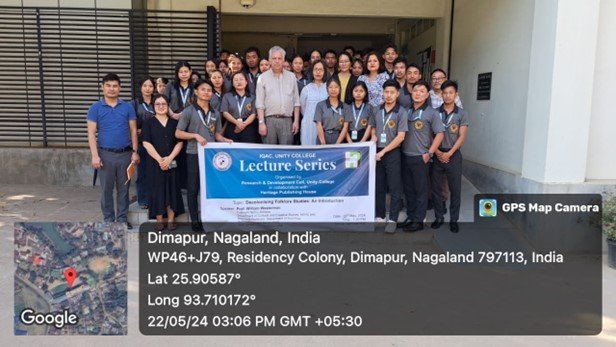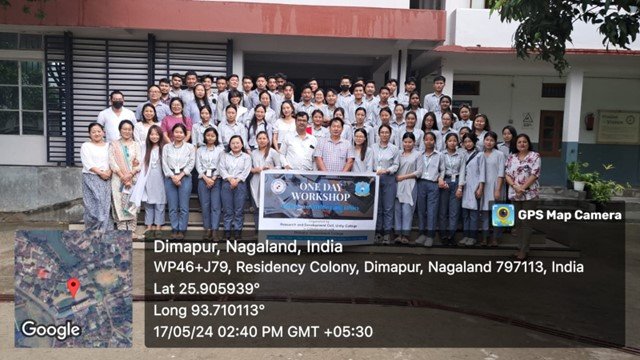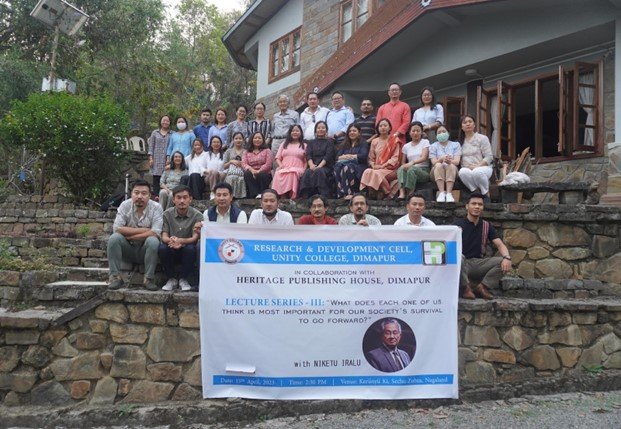The traditional model of a ‘teaching-only’ institution falls short in meeting the dynamic knowledge demands. To ensure quality education, educators must remain abreast of current developments in their fields. Active engagement in research is an effective means for educators to stay attuned to evolving knowledge landscapes. As per the mandates of NEP 2020, the establishment of Research and Development Cells (RDCs) in Higher Education Institutions (HEIs) is crucial for achieving the goals of self-reliance and fostering a culture of multidisciplinary and translational research. Unity College recognizes this imperative and has established a Research and Development (R&D) Cell to nurture research and innovation skills among faculty and students.
In line with the National Education Policy (NEP) 2020, Unity College recognizes the pivotal role of research and innovation in advancing quality education within the higher education system. Our vision at Unity College is to establish a robust mechanism for developing and enhancing the research ecosystem. We are dedicated to aligning with the principles outlined in NEP-2020, striving to create an environment where research flourishes.
The R&D Cell at Unity College is driven by a mission to cultivate an environment conducive to heightened research productivity. We endeavor to nurture a spirit of collaboration across various sectors, including industry, government, and community-based organizations, both locally and globally. We seek to facilitate greater access to research resources and funding opportunities, ensuring that research endeavors are inclusive and accessible to all. By democratizing research, we aim to empower our faculty and students to make meaningful contributions to the academic community and beyond.
Unity College Code of Ethics to Check Malpractices and Plagiarism in Research

Date: 22nd May 2024.
On 22nd of May 2024, Research and Development Cell, Unity College in collaboration with The Heritage Publishing House, Dimapur organised a Lecture Series under the aegis of IQAC, UNITY COLLEGE on the topic “Decolonizing Folklore Studies: An Introduction,” for the PG students (History & Political Science), Unity College. Prof. William Westerman, was the resource person, a Fulbright-Nehru Scholar, Department of Cultural and Creative Studies, NEHU, and also Associate Professor, Department of Sociology, Anthropology and Social Work, New Jersey City University, USA.
The speaker talked about how Anthropology and other sciences have academic or scholarly studies, even folklore has its studies established and bolstered to distinguish which is the best preference for its study. He stated that there was an exhibition of humans by the scholars and that the development of folklore in Europe emerged as Nationalism (also known as Romantic Nationalism). This nationalism took ideas from the countries of Ireland, Scotland, Wales, and Finland by collecting data and publishing their folklore as an instrument of cultural and national independence against colonial powers. How Romantic nationalism developed the idea of nationalism through Gaetic League, and the Irish Folklore Commission. He also mention scholar like James Mooney who documented The Ghost Dance and The Treat of Tears to show the impact of American nationalism in Native American communities. The 19th-century scholars used the collection of narratives from the people who escaped and survived slavery to build opposition against the folklore studies. The best example is William Still an Abolitionists that took details of the slaves who escaped and hid it in the grave. After the abolition of Slavery, it was published and is well known as the first oral history. Further examples were cited of the 20th-century scholars like Ophelia Settle Egypt. She is the first scholar who took hundred interviews but selected 34 narratives which took 35 years to compile into a book. The speaker also highlighted historians like Paul Robeson who popularized the African-American spiritual in art songs and political activism, and Woody Guthrie who popularized folklore in labor movements. In the mid- 20th century after the anti-colonial movement work like Pedagogy of the Oppressed (1968) by Paul Freire focused on the questions, answers, and egalitarian interaction. It also led to the emergence of African anti-colonial writers like Nkrumah who focused on agriculture and traditional economics. He said that the issue of decolonization and indigenous critiques led to the rise of Afro-American studies, Latino studies, Native American studies and ethics studies in North America.
Under the Research and Publication, the Journal of Humanities & Social Sciences (ISSN: 2319-9970) publishes annually on various issues and themes. The next volume for 2023 will be out soon.

Date: 17th May 2024.
On 17th May 2024, the Research & Development Cell, Unity College in collaboration with Dimapur Government College organised a “One Day Workshop on Research Writing and Ethics” for the Post Graduate Studies of Unity College. The aim of this workshop was to engaged the students in research writing. The resource person Dr. Vinyuhu Lhoungu, Assistant Professor, Department of Economics, Dimapur Government College gave his lecture on ‘Research Paper Writing: Structure and Approach’. To start with he posed the question on research approach asking the question what is research? To this, he answered, research is about adding information to the body of knowledge. Further, he delved into the structure of writing a research paper by citing the details of it. He mentioned in detail starting from; the introduction, literature review, objectives, hypotheses, data and methodology, operational definition, results, discussion, suggestions, delimitations, conclusion, references in MLA & APA, tables and figures, annexure and appendices, questionnaires, research ethics, authorship, plagiarism, and research fraud.
In the second technical session, resource person Dr. Hare Krushna Parhi, Assistant Professor, Department of Education, Dimapur Government College, lectured on ‘Research Methodology, Writing and Ethics’. He discussed the research methods emphasizing the types of research. He mentioned the procedures of preparing a dissertation with ethics, writing references and steps taken in research paper writing with ethics. Most of his emphasis was on the types of research there are like, descriptive research, analytical research, applied (action) research, fundamental (basic or pure) research, qualitative research, quantitative research, conceptual research, empirical research, one-time research, longitudinal research, historical research and clinical or diagnostic research, followed by question & answer session.

Date: 15th April 2023.
Lecture Series -III, Niketu Iralu at Kerünyü Ki, Sechu-Zubza on 15th April, 2023. “What does each one of us think is most important for our society’s survival to go forward”.
The Research & Development Cell, Unity College, Dimapur in collaboration with the Heritage Publishing House, Dimapur organized the Lecture Series- III for the teaching faculties with Niketu Iralu at Kerünyü Ki, Sechu-Zubza on 15th April, 2023.
The programme aimed at increasing individual faculty’s interests and engagement on issues and challenges being faced in contemporary Naga society. Niketu Iralu lectured on the topic “What does each one of us think is most important for our society’s survival to go forward”. He provided enlightened insights of the issues and opined that the human element is the key to survival of any society.

Date: 22nd May 2024.
On 22nd of May 2024, Research and Development Cell, Unity College in collaboration with The Heritage Publishing House, Dimapur organised a Lecture Series under the aegis of IQAC, UNITY COLLEGE on the topic “Decolonizing Folklore Studies: An Introduction,” for the PG students (History & Political Science), Unity College. Prof. William Westerman, was the resource person, a Fulbright-Nehru Scholar, Department of Cultural and Creative Studies, NEHU, and also Associate Professor, Department of Sociology, Anthropology and Social Work, New Jersey City University, USA.
The speaker talked about how Anthropology and other sciences have academic or scholarly studies, even folklore has its studies established and bolstered to distinguish which is the best preference for its study. He stated that there was an exhibition of humans by the scholars and that the development of folklore in Europe emerged as Nationalism (also known as Romantic Nationalism). This nationalism took ideas from the countries of Ireland, Scotland, Wales, and Finland by collecting data and publishing their folklore as an instrument of cultural and national independence against colonial powers. How Romantic nationalism developed the idea of nationalism through Gaetic League, and the Irish Folklore Commission. He also mention scholar like James Mooney who documented The Ghost Dance and The Treat of Tears to show the impact of American nationalism in Native American communities. The 19th-century scholars used the collection of narratives from the people who escaped and survived slavery to build opposition against the folklore studies. The best example is William Still an Abolitionists that took details of the slaves who escaped and hid it in the grave. After the abolition of Slavery, it was published and is well known as the first oral history. Further examples were cited of the 20th-century scholars like Ophelia Settle Egypt. She is the first scholar who took hundred interviews but selected 34 narratives which took 35 years to compile into a book. The speaker also highlighted historians like Paul Robeson who popularized the African-American spiritual in art songs and political activism, and Woody Guthrie who popularized folklore in labor movements. In the mid- 20th century after the anti-colonial movement work like Pedagogy of the Oppressed (1968) by Paul Freire focused on the questions, answers, and egalitarian interaction. It also led to the emergence of African anti-colonial writers like Nkrumah who focused on agriculture and traditional economics. He said that the issue of decolonization and indigenous critiques led to the rise of Afro-American studies, Latino studies, Native American studies and ethics studies in North America.
Under the Research and Publication, the Journal of Humanities & Social Sciences (ISSN: 2319-9970) publishes annually on various issues and themes. The next volume for 2023 will be out soon.

Date: 17th May 2024.
On 17th May 2024, the Research & Development Cell, Unity College in collaboration with Dimapur Government College organised a “One Day Workshop on Research Writing and Ethics” for the Post Graduate Studies of Unity College. The aim of this workshop was to engaged the students in research writing. The resource person Dr. Vinyuhu Lhoungu, Assistant Professor, Department of Economics, Dimapur Government College gave his lecture on ‘Research Paper Writing: Structure and Approach’. To start with he posed the question on research approach asking the question what is research? To this, he answered, research is about adding information to the body of knowledge. Further, he delved into the structure of writing a research paper by citing the details of it. He mentioned in detail starting from; the introduction, literature review, objectives, hypotheses, data and methodology, operational definition, results, discussion, suggestions, delimitations, conclusion, references in MLA & APA, tables and figures, annexure and appendices, questionnaires, research ethics, authorship, plagiarism, and research fraud.
In the second technical session, resource person Dr. Hare Krushna Parhi, Assistant Professor, Department of Education, Dimapur Government College, lectured on ‘Research Methodology, Writing and Ethics’. He discussed the research methods emphasizing the types of research. He mentioned the procedures of preparing a dissertation with ethics, writing references and steps taken in research paper writing with ethics. Most of his emphasis was on the types of research there are like, descriptive research, analytical research, applied (action) research, fundamental (basic or pure) research, qualitative research, quantitative research, conceptual research, empirical research, one-time research, longitudinal research, historical research and clinical or diagnostic research, followed by question & answer session.

Date: 15th April 2023.
Lecture Series -III, Niketu Iralu at Kerünyü Ki, Sechu-Zubza on 15th April, 2023. “What does each one of us think is most important for our society’s survival to go forward”.
The Research & Development Cell, Unity College, Dimapur in collaboration with the Heritage Publishing House, Dimapur organized the Lecture Series- III for the teaching faculties with Niketu Iralu at Kerünyü Ki, Sechu-Zubza on 15th April, 2023.
The programme aimed at increasing individual faculty’s interests and engagement on issues and challenges being faced in contemporary Naga society. Niketu Iralu lectured on the topic “What does each one of us think is most important for our society’s survival to go forward”. He provided enlightened insights of the issues and opined that the human element is the key to survival of any society.